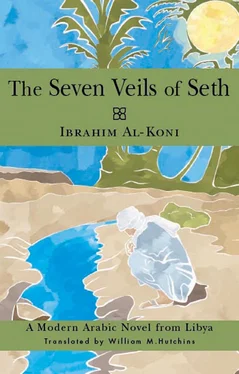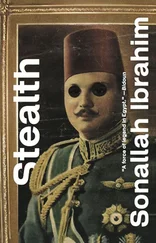The miserable wretch moaned loudly and opened his eyes for the first time. His eyeballs looked so white that they did not seem capable of seeing anything. His eyes expressed astonishment mixed with fright. This was the astonishment of an eye that had grown accustomed to darkness and that had gazed into eternity for a long time. His eye was frightened by the light marking its return. It felt perplexed at having lost space and at having been deprived of the sensation of existing in space. Now the only evidence left to it of its existence in time was the fire burning inside it. The next moment the wretch screamed in a repulsive voice, repeating the appeal: “Fire! Fire! A drop of water to put out the fire!”
He, however, did not grant his patient a drop of water to extinguish the flame, because he had no intention of putting it out. He knew that extinguishing the fire inside a body suffering from smallpox would allow the disease to gain the upper hand over the medicine. The fire was the medicine. The fire was a noble emissary because it would only overpower the strongest adversary. Smallpox, once established in a body, is stronger than the body. For this reason, he had bet on the nobility of fire, on the innate disposition of fire, which recedes unless it can combat champions. Smallpox was the champion to which he had dispatched the fire as a terminator. Now the fire was close to completing its mission. Here the belly was begging for help and thus announcing the victory of fire. Fire’s victory was the cure, a cure for which one paid a steep price in suffering. It was, however, still a cure. He knew the truth about fire, because he would not have been the lord of fire had he not known fire’s true nature.
Following his patient’s recovery, he started a debate with him: “It would be better for you not to settle in an oasis again.” With total candor, the other man replied, “The truth is that I don’t know what I can do with myself if I don’t.”
“Is sedentary life that attractive?”
“The worst thing about sedentary life is its ability to co-opt people. We disdain it and then it gains control of us. We mock it and then it slays us.”
“The most accursed snare is one we disdain.”
“You’re right. We must never disdain anything. I set foot in an oasis for the first time to satisfy my curiosity.”
“Curiosity is dangerous too.”
“I enjoyed my stay and sold a camel.”
“Then you followed that with the sale of another camel after a few days.”
“After some weeks.”
“Then you looked around you and noticed a beautiful woman.”
Ewar smiled and adjusted the end of his veil to hide his cheeks, which were scarred by smallpox. “You’re not mistaken, but. . ”
“There’s no need to be ashamed. A man doesn’t need to be a diviner to understand that the curiosity that leads a person to set foot in an oasis will necessarily lead to the sale of a camel and the entrance of a woman. I wager that the next step was the purchase of some land.”
“You’re not mistaken this time either. What astonishes me is not your ability to discern this but your narration of the tale, apparently from painful, first-hand experience.”
“Once a beautiful woman appears, land must necessarily follow. Is there any peg stronger than land? Is there any tie stronger than a beautiful woman?”
His throat rattled with contemptuous laughter. Then he added, “A man has only two companions when embracing slavery: a piece of property and a woman.”
The convalescent did not capitulate: “Do you know why?”
He did not wait for a reply but allowed his gaze to roam the plain, which was flooded by deceptive mirages. Then, fed up with the mean-spirited mirage, he glanced at the horizon and pressed beyond it, as well, to end with the sky. He tarried there and did not return from this journey until he was burdened by a prophecy: “What is there in our world besides land and women? What would become of this lethal maze we call the desert if we did not find land and a woman in it?”
“Ha, ha. . you take the earth and you take the woman. But then you mustn’t complain when you have to pay for the deal with your body, which a plague has mauled in compensation.”
The man suddenly trembled, however, and asked with strange despair: “But what can we do, master, if departure is this painful? Doesn’t our master think the contractual price of migration oppressive?”
“The matter would be simple if smallpox was the only price we paid for the deal. What’s worse than smallpox during this slumber is another plague you could call the heart’s demise.”
“But, master, in the place we quit we lose things we don’t find in the place we seek. That’s the hardest aspect of the contract to migrate.”
“This is the price of the message.”
“Message?”
Migration’s messenger remained silent for a time. He adjusted his veil across his face to cover even his eyes, as if he were a priest wishing to conceal some emotion, weakness, sorrow, delight, or prophecy. “Yes, nomadism is also a message. Nomadism is a prophecy.”
“What an inhumane prophecy!”
“Has the desert ever known a form of prophecy that was humane?”
“I don’t know. But I’ve never sampled anything with a bitterer taste than nomadic travel. Migration is daily death.”
“But it’s also a daily resurrection.”
“I don’t consider the spirit world a form of resurrection. The only thing harsher than death is resurrection from death.”
“Do you know why?” He answered without waiting for a response: “Nomadic travel, like life, can only be a message of deliverance, because it is a message of punishment.”
“I’m tempted to call this another curse that differs little from the plague.”
“Travel truly is fire for the body but balsam for the heart. Sedentary life is truly a balsam for the body but a fire for the heart.”
“Fire! Down with fire! Don’t remind me of the fire.”
“A person who does not wish to remember the fire that consumes his innards must endure the fire that buffets his skin.”
He fell silent. Then as he watched the mirage on the plain he added: “Even children are careful to refrain from putting their hands in the fire once they’ve been burned.” His companion remained silent. Then he continued: “I did not save your life for you to forsake me. So, beware!”
His seated companion bowed his head and raked the pebbles with his finger, creating patterns. The master of deliverance asked pointedly: “Isn’t it wrong for children to be more astute than we are?”
“Explain.”
“What need is there for me to explain?” But he immediately proceeded to warn: “Don’t put your finger in the fire again.”
“Do you want me to avoid setting foot in an oasis ever again?”
“You can stay in an oasis as a wayfarer but don’t ever lay aside your traveler’s staff there again.”
“Is this a commandment?”
“Yes, the first and last commandment.”
He was silent for a time as he dug a little vault in the earth. Then he erected a building and made some roads around it. Finally he destroyed his creation with a single blow and said, “Thrusting your hand into the fire twice is truly insane.”
“Insanity’s worse than death, so watch out.”
“One whose hand has been burned by the fire has no choice but to obey.”
He stared at him. Their eyes flashed. The jenny master asked, “Is that a promise?”
He gazed at him for a long time before mumbling in a voice that was scarcely audible, “Promise. . ”
PART II Section 3: The Names
Читать дальше












